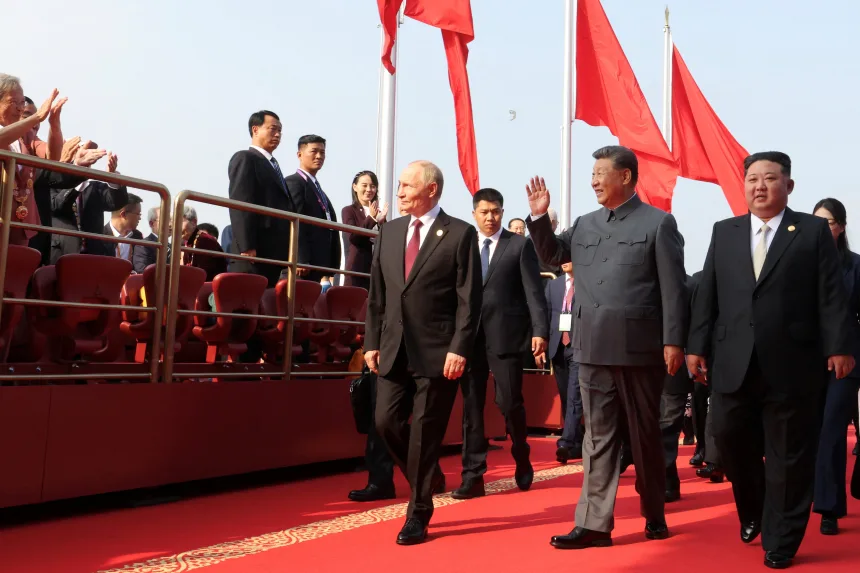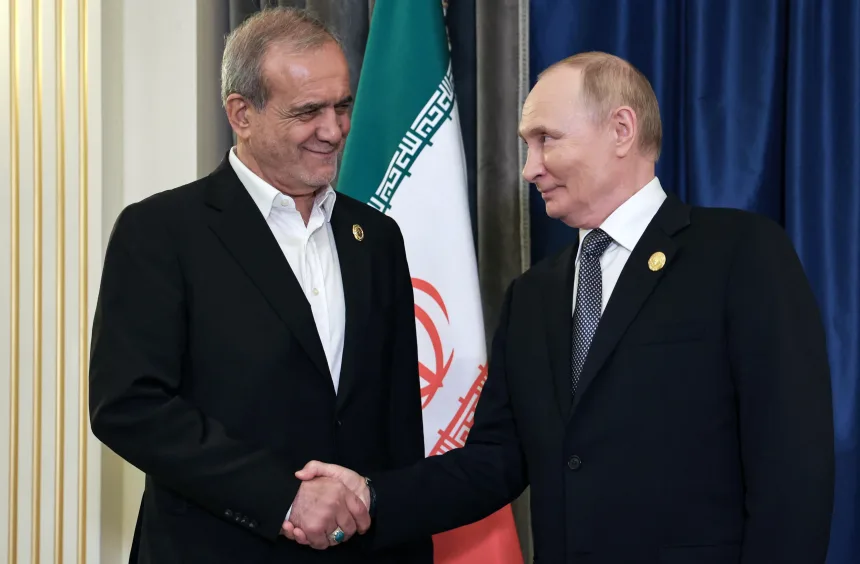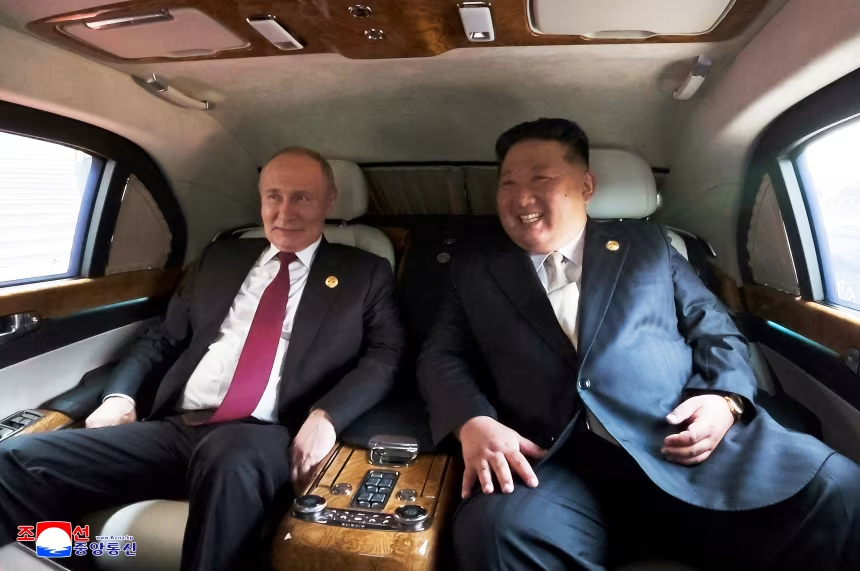European security under pressure
European security is entering a new era after Russian President Vladimir Putin’s high-profile appearance at a military parade and summit in China this week. Surrounded by China’s Xi Jinping, India’s Narendra Modi, Iran’s Masoud Pezeshkian and North Korea’s Kim Jong Un, Putin sought to demonstrate that Moscow is far from isolated. For Europe, the display underscored how fragile its own security architecture has become in the face of shifting global alliances.
Three years after launching his war on Ukraine, Putin’s campaign continues only because of outside support. Chinese and Indian money, Iranian weapons, and manpower from North Korea have enabled Russia to prolong a conflict once expected to last weeks. This has direct consequences for European security, as the continent now faces a prolonged conflict on its doorstep with global powers backing Moscow.
A coalition against Western dominance
The leaders gathered in Beijing may not share much affinity – some do not even like each other – but they recognise a rare opportunity. Each has a stake in reducing Western dominance of global affairs. For Europe, this alignment represents a threat, as it pits its own security interests against a bloc of major economies and military powers.
The symbolism was striking. Europe has worked for years to isolate Putin, to weaken Russia’s economy and to punish aggression through sanctions. Yet there he was, flanked by world leaders, reaffirming partnerships.
“Russia is trying to demonstrate that even though it has been isolated from the Western world, it still has partners and allies which are economically strong countries,” said Natia Seskuria, an associate fellow at the Royal United Services Institute. “This isolation doesn’t mean Russia’s economy will crumble or that Russia will be unable to sustain its war effort.”
Such images force Europe to reconsider its position. European security once rested on assumptions that the US would always guarantee protection and that Russia could be contained. Both of those pillars now look uncertain.
A weakening US role
The post-Cold War order is under strain. The United States, under President Donald Trump, has pulled back from global commitments in favour of “America First.” Europe, meanwhile, faces its own internal challenges, from surging far-right nationalism to economic strains. This vacuum has given Russia, China and India space to reshape the rules of the game.
“The dominance of the Western alliance in international affairs is receding,” said John Lough of the New Eurasian Strategies Centre. “They see the opportunity to re-engineer the international system.”
Trump himself mocked the summit with a barbed message to Xi: “Please give my warmest regards to Vladimir Putin, and Kim Jong Un, as you conspire against the United States of America.” But even he acknowledged the gathering’s significance.

Pragmatism drives China and India
Despite the smiles in Beijing, China and India’s policies toward Russia remain pragmatic. Both claim neutrality on the war in Ukraine but have become Moscow’s economic lifelines.
Sanctions on Russian oil gave them the chance to buy energy at lower prices, while helping Russia fund its war. China and India are now the two biggest buyers of Russian oil and coal, with China also importing large amounts of refined products. Their support extends beyond energy. Western sanctions block Russia from accessing advanced technology, so Chinese and Indian companies provide so-called dual-use items like chips and telecom equipment. These can be used in both civilian and military systems, and many have ended up in weapons deployed in Ukraine.
“You only have to look at the number of Chinese components in the Russian drones landing in Ukraine to see how important China is,” Lough said.
The alignment is partly ideological. “China is much closer to Russia when it comes to multipolarity and decreasing Western influence,” Seskuria explained. “There is an ideological affinity and pure economic interest as well.”
India’s interest is more subtle but still significant. Lough noted: “Indians are not unhappy to see Russia pushing the Global South’s agenda and ensuring global governance adapts to rising economies with large populations.”
For Europe, this is a dilemma. Its security depends on deterring Moscow, but it cannot afford to alienate China and India, who may hold the only real leverage over Putin.

Iran and North Korea: unconditional support
If China and India are pragmatic supporters, Iran and North Korea are unconditional. Already sanctioned and isolated, they have little to lose by backing Russia.
Iran played a critical role in the early stages of the war. It shared expertise on surviving sanctions and provided hardware, most notably Shahed drones, which have reshaped Russia’s battlefield tactics. Tehran and Moscow have since deepened ties with joint military exercises and partnership agreements.
But Tehran has also seen the limits of this alliance. Putin offered little when Israel and the US attacked Iran this summer, and he did not intervene to protect Bashar al-Assad in Syria when his regime collapsed late last year.
For North Korea, cooperation is transactional. Isolated and impoverished, it supplies manpower in exchange for Russian economic and political backing. “They don’t have much to lose,” Seskuria said. “There is no public opinion that can oppose Kim’s decisions.”

An alliance of convenience
The Beijing summit was choreographed to send a message: these nations, though not natural allies, can align to challenge Western power.
“It’s a functional relationship, not based on affection,” Lough said. “It’s an alliance of interests rather than of countries, and interests can change.”
Yet the implications for European security are profound. The parade showed that Moscow is not as cut off as Europe hoped, and that other powers are willing to challenge the West’s influence.

Europe’s response
The shifts did not happen overnight. Europe may have been caught off guard by Russia’s invasion in 2022, but it has since begun to adapt. Germany rewrote its constitution to boost defence spending. Sweden and Finland abandoned neutrality to join NATO. Across the continent, defence cooperation is growing.
“We are starting to see now what the Europeans are made of,” Lough said. “In terms of defence, the changes are remarkable.”
Still, Europe faces hard questions. Can it guarantee its own security if the US steps back further? Can it deter Russia if Moscow has backing from Beijing, Delhi, Tehran and Pyongyang? And how should it deal with a multipolar world where old alliances no longer hold?
A new reality for European security
The display in Beijing was unsettling but not decisive. Analysts warn against exaggerating the closeness of the group. Their ties are functional, driven by need and pragmatism, not deep friendship. Yet for Europe, the symbolism was unavoidable.
As Seskuria put it, the parade showed that Russia “still has partners and allies which are economically strong.” That fact alone reshapes Europe’s calculations.
European security, once anchored by American leadership and the idea of Russian weakness, must now adjust to a world where adversaries are stronger and more coordinated. Interests may shift, but the risk to Europe’s security is permanent.
“We are not at the stage where it’s suddenly game over,” Lough concluded. “But European security will never be the same again.”
Source: this article was informed by a piece from CNN
Also read: China military parade 2025 shows off new superweapons
For more videos and updates, check out our YouTube channel.


